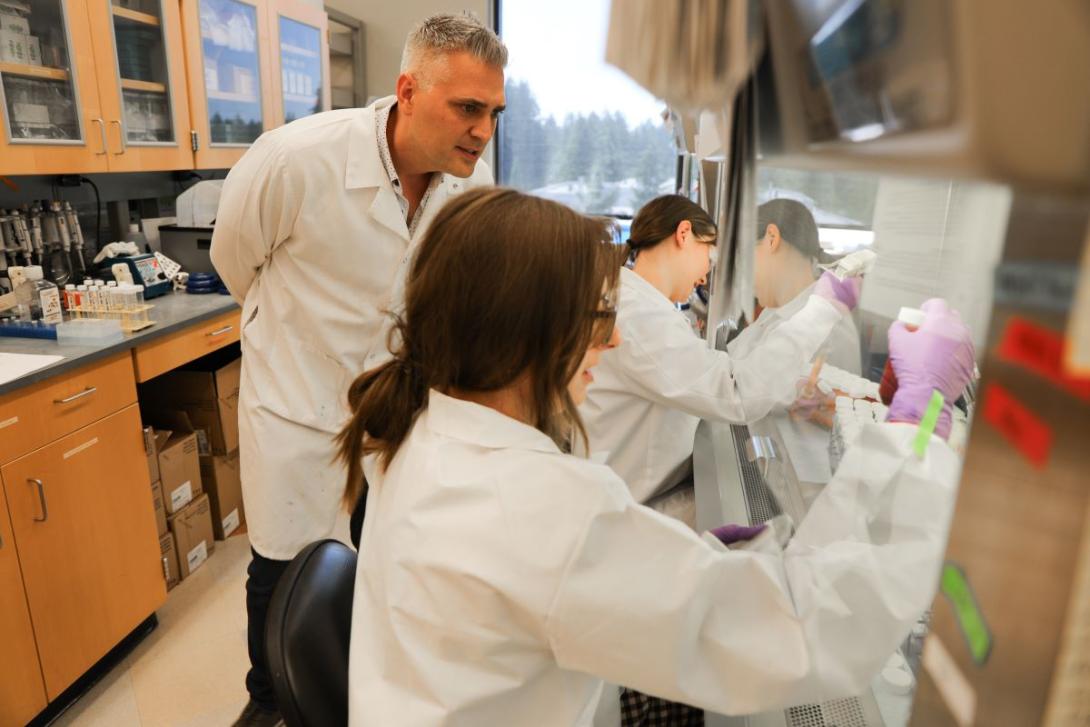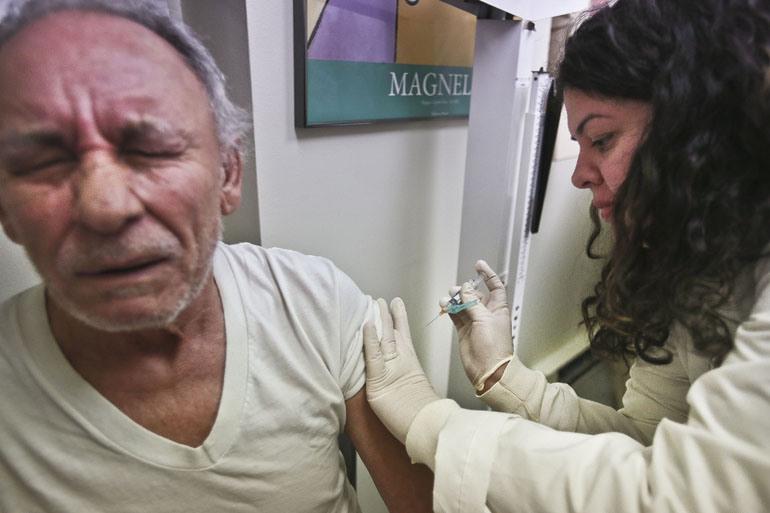
Researchers at Oregon Health & Science University say a new study suggests that a different kind of vaccine could eliminate the need for annual flu shots while helping protect against other strains of the virus, including bird flu.
The study looked only at the effects of the experimental vaccine on a small number of monkeys, and human trials to prove safety and effectiveness are years away at best.
But, the researchers say, the new study indicates the potential to have a vaccine that is effective even as the flu virus mutates.
The results show that a “one-and-done” shot is realistic and could be achieved within a decade, according to Jonah Sacha, chief of the Division of Pathobiology at OHSU’s Oregon National Primate Research Center and senior author on the study. The study was published Friday in the journal Nature Communications.
Researchers in the study inoculated 11 macaque monkeys at the University of Pittsburgh with a vaccine formulated on the version of the influenza virus that circulated in 1918.
The monkeys were then exposed to the H5N1 bird flu virus that is currently circulating among dairy cows across the United States. Six of the inoculated monkeys survived. However, another group of six monkeys who were not vaccinated all died after being exposed to the same strain of bird flu.
The new study comes as public health scientists closely watch the H5N1 bird flu virus that has jumped to dairy cows and some people, with some warning that its progression could signal a new pandemic.
“The world remains at risk of another influenza pandemic,” the study’s authors wrote. “The four influenza pandemics of the past 100 years killed tens of millions of people, yet a universal influenza vaccine capable of protecting against future pandemic influenza viruses still does not exist.”
Already the common flu can be deadly, especially for the elderly and very young. The Centers for Disease Control and Prevention estimates that as many as 72,000 people died from the flu and up to another 830,000 were hospitalized from the virus during the most recent flu season in the U.S. In 2022 in Oregon, 370 people died of influenza or of pneumonia, which can stem from the flu. Another 1,000 people were hospitalized with the flu in the Portland area during the 2022-2023 flu season, according to the state.
“That got my mind turning. Maybe we should find a different way to vaccinate against influenza."
A new vaccine approach
Sacha told The Lund Report that his interest in improving the vaccine was sparked by his then 4-year-old son being so sickened by H1N1 swine flu in 2014 that he required hospitalization. His family had been vaccinated against the flu, but it didn’t protect them against the strain of the virus he picked up while traveling to a conference in Australia, he said.
“That got my mind turning,” Sacha said. “Maybe we should find a different way to vaccinate against influenza. Because these current vaccines that we use, they change every year and they’re clearly kind of a guess based on what (flu) is going to come out.”
Currently, annual flu shots are formulated in a manner intended to anticipate how the virus will evolve and trigger antibodies to fight it. Their effectiveness varies year by year and wanes as the virus changes.

That’s because traditional vaccines are keyed toward proteins on the exterior of the virus, which continuously evolve and mutate.
So for years, researchers at a variety of institutions have pursued what’s called a “universal” flu vaccine, one that could combat even newer variants of the virus over a person’s lifetime with a single inoculation.
The OHSU researchers are working on a version that harnesses the cytomegalovirus, a common herpes virus related to Chickenpox that usually results in mild or no symptoms, but is long-lasting.
The cytomegalovirus provokes an immune response from the body’s T cells, which target the virus’ internal proteins, rather than the rapidly evolving ones on its exterior.
That’s why researchers were excited by the study’s indication of effectiveness for a vaccine based on a 1918 version of the flu, even if the test involved monkeys, not humans. In the university’s statement, Sacha said the vaccine worked because the virus’ interior protein has been well preserved “even after almost 100 years of evolution.”
Although just six of the 11 inoculated monkeys survived, Sacha said the trial was successful considering that the monkeys were given a vaccine geared toward a 100-year-old flu strain and then exposed to H5N1, which he called “one of the most pathogenic viruses” known.
“We as humans would never take those odds for a vaccine, but against a virus that’s this wicked, it’s pretty good,” he said. “It’s a start. We have to do better if we are ever going to go forward.”
Sacha said future trials will use a version of the vaccine optimized for more current flu strains. The vaccine would then go to clinical trials on humans, which he said could be done fairly quickly because there are testing sites that use healthy volunteers.
Sacha said an earlier experimental HIV vaccine developed by OHSU researchers laid the groundwork for the technology used in the flu vaccine.
“We as humans would never take those odds for a vaccine, but against a virus that’s this wicked, it’s pretty good. It’s a start. We have to do better if we are ever going to go forward.”
OHSU, researchers are part-owners of technology
Researchers at OHSU have been working on the same vaccine technology for more than a decade, starting with efforts to combat HIV.
In 2016, the university sold the technology to Vir Biotechnology, Inc., a San Francisco startup that’s publicly traded. OHSU remains a part-owner of Vir, and several of the researchers who participated in the recent study also have holdings in Vir, according to the study’s conflict-of-interest disclosure. Sacha said he does not own Vir Stock and is not affiliated with the company, but did do consulting for it years ago.
Starting more than a decade ago OHSU researchers have reported similarly promising findings about its potential HIV vaccine based on the same technology. But human trials did not begin until last year.
The human trials are necessary to show both safety and effectiveness, as the cytomegalovirus is considered to be species-specific.
OHSU researchers believe the same technology shows promise for fighting cancer as well.